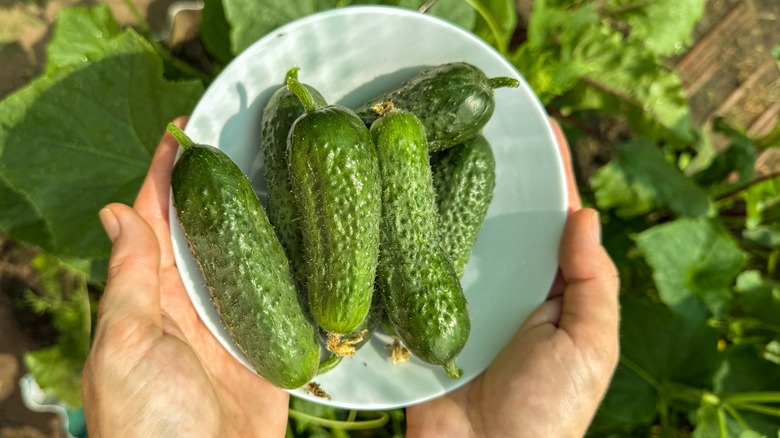'The Pickle Capital Of Arkansas' Is A River Valley Gem With Festivals And Scenic Nature
Pickles have popped. In the last few years, they've become one of the trendiest flavors on the market, showing up in everything from beer to cotton candy. In the United States, the pickled cucumber is the default: That salty, vinegary, dilly flavor with a textured crunch is the most stereotypical "pickle," though you can technically pickle almost anything — eggs, onions, garlic, okra, and even peaches. Just use the 3-2-1 ratio: Three parts vinegar, two parts water, one part sugar. There are pickle stores, pickle restaurants, pickle bar pop-ups, and pickle parties — even social media accounts and blogs dedicated to inventive ways to preserve things in brine. But one small town in Arkansas has long been ahead of the pickle trend. Atkins, about 65 miles northwest of Little Rock — full of vibrant neighborhoods and artistic gems – has been known as the pickle capital of Arkansas since 1945.
After the Civil War, Northerners moved South seeking economic opportunity. One was Boston sugar importer Elisha Atkins, who helped finance the Little Rock and Fort Smith Railroad, an important shipping line. The town was officially incorporated in the 1870s and given his name. The town continued to evolve over the next several decades and is now listed on the National Register of Historic Places. The Missouri-Pacific Depot, built around 1910, played a key role in the Atkins' growth and was essential once the Goldsmith Pickle Company arrived. The company cultivated 1,200 acres of cucumbers and partnered with the city to build two factory buildings and 57 wooden tanks capable of storing 57,000 bushels of pickles at once. Pickles anchored the economy of Aktins, and in return, the town launched an annual Picklefestival in 1992, celebrating its beloved briny mascot and the multimillion-dollar, multistate industry it sparked.
Picklefest embraces the history and significance of the preserved cucumber
Tucked into Pope County in west-central Arkansas, Atkins lies just east of Russellville off Interstate 40. Although the town's famed pickle factory closed in 2002, the celebration lives on: For two days every third weekend in May, downtown Atkins comes alive with music, competitions, festivities, and plenty of pickled everything. From Northeast First Street to North Church Street, vendors sell a range of pickle-flavored treats alongside pickle-eating contests, pickle juice-drinking competitions, talent shows, live music, activities, art booths, and, in some years, even a rodeo. The festival's signature food is the fried dill pickle, made from a secret recipe invented in 1963. About 2,500 of the beloved snacks are served each year. There's also a Mr. Dill Pickle and Miss Sweet Pickle pageant, showcasing local charm and talent. Picklefest is largely volunteer-run, with proceeds traditionally supporting community initiatives.
Pickling dates back to early Mesopotamian civilizations, and across Asia, fermented and pickled vegetables have been staples for centuries. Pickles have also been linked to notable historical figures — Cleopatra allegedly credited them with her beauty, while Napoleon Bonaparte paid rewards for innovations in food preservation for his military. Around the turn of the 20th century, at the Chicago World's Fair, Henry Heinz, known as the "Pickle King," boosted his brand by giving away "pickle pins," elevating Heinz to national prominence.
During World War II, pickles were government-rationed, and nearly half the country's supply was shipped to the troops. After the war, Atkins' pickling and manufacturing industry eventually grew into a multimillion-dollar business, producing specialty products like Tomolives — small, pickled tomatoes — and pickle gift packages for visiting VIPs. Eventually, the market became oversaturated, and the town's factory was repurposed for poultry processing.
Pickles aren't the only thing Atkins offers
Getting to Atkins is straightforward. The closest commercial airport is Bill and Hillary Clinton National Airport in Little Rock, about 70 miles away. If you're riding Amtrak's Texas Eagle — America's longest passenger train route – you can hop off in Little Rock and detour to Atkins. (Time your trip to catch Picklefest!) Atkins is in the Arkansas River Valley, close to the Ozark National Forest –1.2 million acres of trees, streams, and rugged trails — as well as lush Arkansas wine country, where local wineries offer tastings and tours. Post Winery is a beautiful, century-old, family-run vineyard, about 50 miles from town.
Lake Atkins is one of the area's crown jewels: A 752-acre lake with a public boat launch, bait shop, and campsites. It's popular with anglers seeking largemouth bass, catfish, and crappie, and it's also a birding hotspot, attracting dozens of species to its bald cypress-lined shores. Nearby, Petit Jean State Park offers even more for nature lovers, with scenic mountain overlooks, waterfalls, and camping. The park is also a certified Trail of Tears National Historic Trail site, where the U.S. government forcibly relocated Native American tribes. Visitors can learn more about this tragic history at the park.
Dining at Atkins International Cafe and Deli is a must for Mexican American food — from steak and potatoes to chicken fajitas — and a dose of nostalgia. Cunningham's is another local favorite, known for pillowy cinnamon rolls and smoky barbecue. Hours can be inconsistent, so it's worth calling ahead. There aren't many hotels in town, but you'll find lodging options up the road in Russellville. For a more scenic stay, book a room or "hideaway house" in Cedar Falls Lodge, a rustic motel on Petit Jean Mountain inside the state park.


